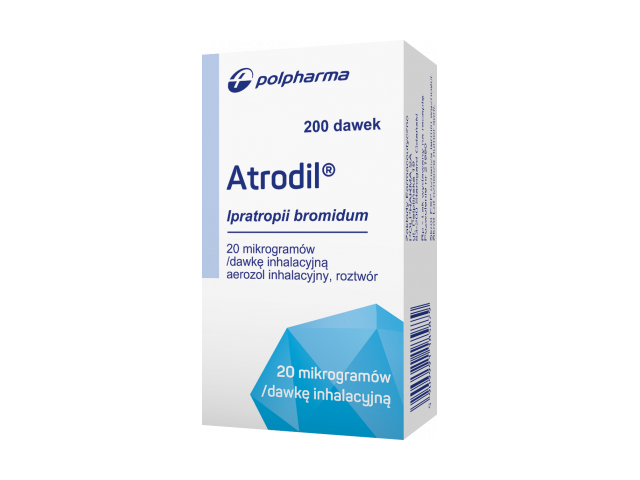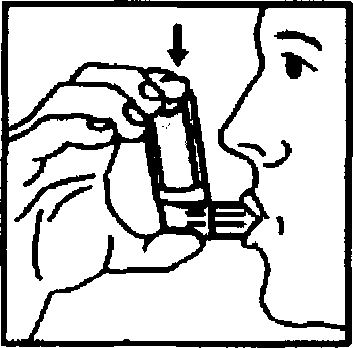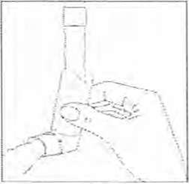

Atrodil

Ask a doctor about a prescription for Atrodil

How to use Atrodil
Package Leaflet: Information for the Patient
Atrodil, 20 micrograms/dose, inhalation aerosol, solution
Ipratropium bromide
Read the package leaflet carefully before using the medicine, as it contains important information for the patient.
- Keep this leaflet, you may need to read it again.
- If you have any further questions, ask your doctor or pharmacist.
- This medicine has been prescribed for you only. Do not pass it on to others. It may harm them, even if their symptoms are the same as yours.
- If you experience any side effects, including those not listed in this leaflet, tell your doctor or pharmacist. See section 4.
Table of Contents of the Leaflet
- 1. What is Atrodil and what is it used for
- 2. Important information before using Atrodil
- 3. How to use Atrodil
- 4. Possible side effects
- 5. How to store Atrodil
- 6. Contents of the pack and other information
1. What is Atrodil and what is it used for
Atrodil is a pressurized inhalation solution. The medicine contains ipratropium bromide, which belongs to a group of medicines called bronchodilators. Atrodil is indicated as a bronchodilator for the maintenance treatment of bronchospastic conditions in chronic obstructive pulmonary disease (COPD), including chronic bronchitis and emphysema, and in bronchial asthma.
2. Important information before using Atrodil
When not to use Atrodil
- if you are allergic to ipratropium bromide or any of the other ingredients of this medicine (listed in section 6).
- if you are allergic to similar medicines containing atropine or its derivatives.
Warnings and precautions
Before starting to use Atrodil, discuss it with your doctor or pharmacist. Be particularly careful when using Atrodil:
- if you experience eye pain or discomfort, blurred vision, seeing a rainbow-colored ring around a light source, or changes in color vision accompanied by eye redness, you should immediately consult a doctor to assess whether these symptoms may be due to complications (pupil dilation, increased eye pressure, glaucoma).
- if you have narrow-angle glaucoma (increased eye pressure) or are prone to glaucoma. Symptoms may worsen if the medicine is accidentally sprayed into the eye.
- if you have prostate enlargement causing difficulty urinating (only in men).
- if you have a narrowing of the urine outflow tract.
- if you have cystic fibrosis; gastrointestinal motility disorders (e.g., constipation, diarrhea) may occur.
- if breathing difficulties do not improve or worsen: you should immediately contact your doctor, who will verify the treatment plan. The doctor may recommend additional medications. Never exceed the prescribed dose, as this may lead to severe side effects. Do not allow Atrodil to get into your eyes.
Atrodil with other medicines
Tell your doctor or pharmacist about all the medicines you are taking now or have taken recently, as well as any medicines you plan to take. Some medicines may interact with Atrodil. This may change the effect of Atrodil or other medicines. In particular, inform your doctor if you are taking any of the following medicines:
- other bronchodilators, such as salbutamol;
- beta-adrenolytics used to treat heart diseases and high blood pressure, e.g., atenolol, bisoprolol;
- xanthine medicines, e.g., theophylline, aminophylline;
- other anticholinergic medicines, e.g.
- pridinol, biperiden (used to treat Parkinson's disease),
- scopolamine (an antiemetic and used in spastic conditions of the gastrointestinal tract and urinary tract).
Pregnancy and breastfeeding
If you are pregnant or breastfeeding, think you may be pregnant, or plan to have a child, consult your doctor or pharmacist before using this medicine. The safety of using this medicine during pregnancy has not been established. Atrodil should only be used during pregnancy if your doctor considers it necessary. It is not known whether ipratropium bromide passes into breast milk. Therefore, Atrodil should only be used in breastfeeding women if your doctor considers it necessary.
Driving and using machines
No studies have been conducted on the effect of the medicine on the ability to drive and use machines. If you experience dizziness or vision disturbances (blurred vision, seeing a rainbow-colored ring around a light source) while using Atrodil, you should refrain from performing these activities.
Atrodil contains ethanol
The medicine contains small amounts of ethanol (alcohol), less than 100 mg per dose. One metered dose (puff) contains 8.42 mg of anhydrous ethanol.
3. How to use Atrodil
This medicine should always be used as directed by your doctor. If you are unsure, consult your doctor or pharmacist. Your doctor will adjust the dosage to your individual needs. If not otherwise instructed, use the medicine as follows:
Adults and children over 6 years of age
2 puffs at each use, 4 times a day, but no more than 12 puffs per day. Do not exceed the recommended daily dose. If the treatment does not bring significant improvement or if your condition worsens, consult your doctor to establish a new treatment plan. In case of sudden or severely worsening shortness of breath (breathing difficulties), contact your doctor immediately. In children, Atrodil aerosol should only be used under adult supervision.
Method of administration
To achieve the best treatment results, it is essential to use the inhalation aerosol correctly, as described below. If you have any doubts after reading the instructions, consult your doctor, pharmacist, or nurse.
Checking the inhaler
- 1) Before using the inhaler, shake it. Do not shake too vigorously.
- 2) If the inhaler is new or has not been used for at least three days, shake the inhaler and then release twodoses into the air to check its proper functioning.
Instructions for use
1.
Remove the protective cap from the mouthpiece, see Figure 1.

2.
Shake the inhaler.
3.
Holding the inhaler, take a deep breath, and then immediately…
4.
Place the mouthpiece in your mouth, holding it with your lips. After starting a slow, deep breath through your mouth, press the aerosol container firmly as shown below to release a dose of Atrodil. Then continue breathing in. See Figure 2.

Figure 2
5.
Hold your breath for a few seconds, or as long as possible without discomfort, and then remove the mouthpiece from your mouth and breathe out.
6.
If you need to take more than one dose, wait at least one minute and then shake the inhaler again and repeat steps 3, 4, and 5.
7.
After use, put the protective cap back on the mouthpiece. The container is not transparent. Therefore, you cannot see if it is empty. The inhaler contains 200 doses. After they are used up, a small amount of solution may still be left in the container. However, you should replace the inhaler with a new one, as further use may not ensure the delivery of the correct dose of the medicine.
Cleaning the inhaler
The inhaler mouthpiece should be washed at least once a week. It is essential to keep it clean to ensure that the medicine does not accumulate on the mouthpiece walls and block the inhaler's use. To wash the inhaler mouthpiece, first remove the protective cap and remove the medicine container from the inhaler. Rinse the mouthpiece with warm water until all visible impurities are removed - see Figure 3.

Figure 3
After washing, shake off the water and let the mouthpiece air dry. Do not useany drying devices. When the mouthpiece is dry, put the medicine container and protective cap back on the inhaler - see Figure 4.

Figure 4
Note:
The plastic mouthpiece is specially designed for use with the Atrodil inhalation aerosol to ensure the delivery of the correct dose of the medicine each time. The mouthpiece should never be used with any other inhalation aerosol, and vice versa, Atrodil inhalation aerosol should not be used with any other mouthpiece than the one provided with this medicine. Since the container is under pressure, do not use force to open it, and do not expose it to temperatures above 50°C. If using the inhaler is difficult for you, Atrodil should be used with the AeroChamber inhalation chamber in such situations. You should read the instructions for use of the AeroChamber inhalation chamber provided with the packaging to get detailed information on its proper use.
Using a higher dose of Atrodil than recommended
If you accidentally take a higher dose of the medicine than recommended, consult your doctor immediately. Mild symptoms of ipratropium bromide overdose may occur, such as dryness of the mucous membrane of the mouth, vision disturbances, and increased heart rate.
Missing a dose of Atrodil
If you miss a dose, take it as soon as possible. However, if it is almost time for the next dose, skip the missed dose and take the next dose at the scheduled time. Do not take a double dose to make up for the missed dose. Then continue with your regular dosing schedule.
Stopping the use of Atrodil
If you stop using Atrodil, breathing difficulties may recur or worsen. Therefore, you should use Atrodil for as long as your doctor recommends. If you have any further questions about using this medicine, consult your doctor or pharmacist.
4. Possible side effects
Like all medicines, this medicine can cause side effects, although not everybody gets them.
Stop using the medicine and consult your doctor immediately if you experience:
- breathing difficulties or sudden worsening of wheezing,
- angioedema (sudden swelling of the skin or mucous membranes, which can cause difficulty breathing and swallowing),
- severe, life-threatening allergic reactions (anaphylactic reactions), characterized by swelling of the tongue, lips, and face, or sudden breathing difficulties,
- blurred vision, pupil dilation, increased eye pressure, glaucoma, eye pain, seeing a rainbow-colored ring around a light source, conjunctival hyperemia (redness of the white part of the eye), corneal edema (swelling of the protective outer layer of the eye).
Atrodil may cause the following symptoms:
Frequently(occurring in less than 1 in 10 patients):
- headache, dizziness,
- cough, throat irritation,
- dryness of the mucous membrane of the mouth,
- nausea, gastrointestinal motility disorders.
Less frequently(occurring in less than 1 in 100 patients):
- palpitations, supraventricular tachycardia (abnormally fast heart rate),
- blurred vision, pupil dilation, increased eye pressure, glaucoma, eye pain, seeing a rainbow-colored ring around a light source, conjunctival hyperemia (redness of the white part of the eye), corneal edema (swelling of the protective outer layer of the eye),
- bronchospasm, including paradoxical bronchospasm (inhalation-induced bronchospasm), laryngospasm (sudden spasms of the vocal cords, which can affect breathing and speech), pharyngeal edema (swelling of the mucous membrane of the throat), dry throat,
- diarrhea, constipation, vomiting, stomatitis (inflammation of the mucous membrane of the mouth), oral edema,
- urinary retention,
- rash, itching,
- angioedema, hypersensitivity, severe allergic reactions (anaphylactic reactions).
Rarely(occurring in less than 1 in 1,000 patients):
- atrial flutter (very fast, irregular heart rate), increased heart rate,
- accommodation disorders (vision disturbances),
- urticaria.
Reporting side effects
If you experience any side effects, including those not listed in this leaflet, tell your doctor or pharmacist. Side effects can be reported directly to the Department of Adverse Reaction Monitoring of Medicinal Products, Medical Devices, and Biocidal Products
Al. Jerozolimskie 181C
02-222 Warsaw
Phone: +48 22 49 21 301
Fax: +48 22 49 21 309
Website: https://smz.ezdrowie.gov.pl
Side effects can also be reported to the marketing authorization holder. By reporting side effects, you can help provide more information on the safety of this medicine.
5. How to store Atrodil
Keep the medicine out of sight and reach of children. Protect from direct sunlight and do not freeze. Do not store above 30°C. Do not puncture or burn, even if the container appears to be empty. Do not use this medicine after the expiry date stated on the packaging. The expiry date refers to the last day of the month. The inscription on the packaging after the abbreviation EXP means the expiry date, and after the abbreviation Lot means the batch number. Medicines should not be disposed of via wastewater or household waste. Ask your pharmacist how to dispose of medicines that are no longer needed. This will help protect the environment.
6. Contents of the pack and other information
What Atrodil contains
- The active substance of the medicine is ipratropium bromide. Each dose contains 21 micrograms of ipratropium bromide monohydrate, equivalent to 20 micrograms of ipratropium bromide.
- The other ingredients are: 1,1,1,2-tetrafluoroethane, anhydrous citric acid, purified water, anhydrous ethanol. This medicine contains fluorinated greenhouse gases. Each 200-dose inhaler contains 11.37 g of 1,1,1,2-tetrafluoroethane, equivalent to 0.0163 tons of CO2 equivalent (GWP = 1430).
What Atrodil looks like and contents of the pack
Aluminum container with an FCP (fluorocarbon polymer) layer and a 50 µl metering valve with a PP mouthpiece and PP closure, in a cardboard box. Each container is filled with 10 ml of a colorless, clear solution, equivalent to approximately 200 doses.
Marketing authorization holder and manufacturer
Marketing authorization holder
Polpharma S.A.
Pelplińska 19, 83-200 Starogard Gdański
phone: +48 22 364 61 01
Manufacturer
Polpharma S.A.
Pelplińska 19, 83-200 Starogard Gdański
Other sources of information
Detailed instructions for using the Atrodil inhalation aerosol are available by scanning the following QR code with your smartphone. The same information is also available on the website: www.instrukcjeatrodil.pl
(QR code)
Date of last revision of the leaflet:
QR
| LABORATORIO ALDO-UNIÓN S.L. | |
| Baronesa de Maldá, No 73 | |
| 08950 Esplugues de Llobregat (Barcelona) | |
| Spain | |
- Country of registration
- Active substance
- Prescription requiredYes
- Manufacturer
- ImporterLaboratorio Aldo-Union S.L. Laboratorio Echevarne, S.A.
- This information is for reference only and does not constitute medical advice. Always consult a licensed doctor before taking any medication. Oladoctor is not responsible for medical decisions based on this content.
- Alternatives to AtrodilDosage form: Aerosol, 20 mcg/dose inh.Active substance: ipratropium bromideManufacturer: Boehringer Ingelheim Pharma GmbH & Co. KGPrescription requiredDosage form: Solution, 0.25 mg/mlActive substance: ipratropium bromideManufacturer: Instituto De Angeli S.r.l.Prescription requiredDosage form: Aerosol, 20 mcg/inhalation doseActive substance: ipratropium bromidePrescription required
Alternatives to Atrodil in other countries
The best alternatives with the same active ingredient and therapeutic effect.
Alternative to Atrodil in Ukraine
Alternative to Atrodil in Spain
Online doctors for Atrodil
Discuss dosage, side effects, interactions, contraindications, and prescription renewal for Atrodil – subject to medical assessment and local rules.














